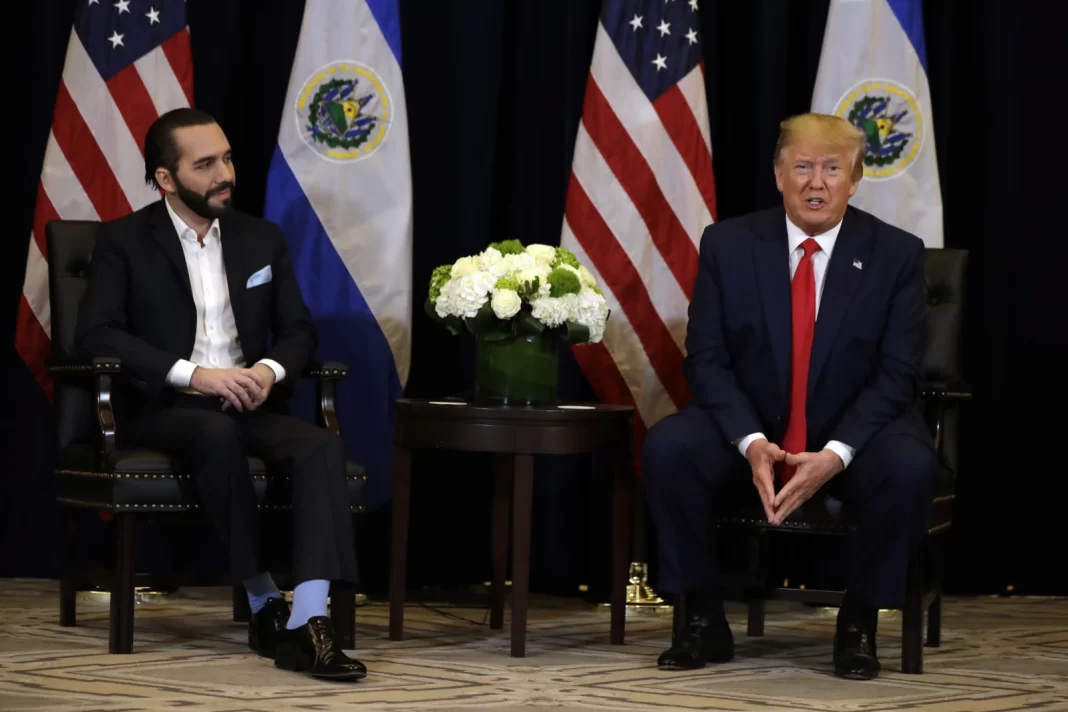President Donald Trump’s top advisers and Nayib Bukele, the president of El Salvador, said Monday that they have no basis for the small Central American nation to return a Maryland man who was wrongly deported there last month. Bukele called the idea “preposterous” even though the U.S. Supreme Court has called on the administration to “facilitate” Kilmar Abrego Garcia’s return.
Trump administration officials emphasized that Abrego Garcia, who was sent to a notorious gang prison in El Salvador, was a citizen of that country and that the U.S. has no say in his future. And Bukele, who has been a vital partner for the Trump administration in its deportation efforts, said “of course” he would not release him back to U.S. soil.
“The question is preposterous. How can I smuggle a terrorist into the United States?” Bukele, seated alongside Trump, told reporters in the Oval Office Monday. “I don’t have the power to return him to the United States.”
Should El Salvador want to return Abrego Garcia, the U.S. would “facilitate it, meaning provide a plane,” Attorney General Pam Bondi said.
But “first and foremost, he was illegally in our country, and he had been illegally in our country,” she said. “That’s up to El Salvador if they want to return him. That’s not up to us.”
In a court filing Monday evening, Joseph Mazzara, the acting general counsel for the Department of Homeland Security, said it “does not have authority to forcibly extract” Abrego Garcia from El Salvador because he is “in the domestic custody of a foreign sovereign nation.”
Mazarra also argued that Abergo Garcia is “no longer eligible for withholding of removal” because the U.S. designated MS-13 as a foreign terror organization. Abergo Garcia’s attorneys say the government has provided no evidence that he was affiliated with MS-13 or any other gang.
The refusal of both countries to allow the return of Abrego Garcia, who had an immigration court order preventing his deportation over fears of gang persecution, is intensifying the battle over the Maryland resident’s future. It has also played out in contentious court filings, with repeated refusals from the government to tell a judge what it plans to do, if anything, to repatriate him.
The judge handling the case, Paula Xinis, is now considering whether to grant a request from the man’s legal team to compel the government to explain why it should not be held in contempt.
The fight over Abrego Garcia also underscores how critical El Salvador has been as a linchpin of the U.S. administration’s mass deportation operation.
How Bukele is helping with Trump’s immigration crackdown
Since March, El Salvador has accepted from the U.S. more than 200 Venezuelan immigrants — whom Trump administration officials have accused of gang activity and violent crimes — and placed them inside the country’s maximum-security gang prison just outside of the capital, San Salvador. That prison is part of Bukele’s broader effort to crack down on the country’s powerful street gangs, which has put 84,000 people behind bars and made Bukele extremely popular at home.
“I want to just say hello to the people of El Salvador and say they have one hell of a president,” Trump said as he greeted Bukele, who was wearing a black mock turtleneck sans tie.
Bukele struck a deal under which the U.S. will pay about $6 million for El Salvador to imprison the Venezuelan immigrants for a year.
But Democrats have raised alarm about the treatment of Abrego Garcia and other migrants who may be wrongfully detained in El Salvador. Democratic Sen. Chris Van Hollen of Maryland pushed for a meeting with Bukele while he was in Washington to discuss Abrego Garcia’s potential return, and New Hampshire Sen. Jeanne Shaheen, the top Democrat on the Senate Foreign Relations Committee, urged the administration to release Abrego Garcia and others “with no credible criminal record” who were deported to the maximum-security prison.
“Disregarding the rule of law, ignoring unanimous rulings by the Supreme Court and subjecting individuals to detention and deportation without due process makes us less safe as a country,” Shaheen said.
Though other judges had ruled against the Trump administration, this month the Supreme Court cleared the way for Trump to use the Alien Enemies Act, an 18th century wartime law, to deport the immigrants. The justices did insist that the immigrants get a court hearing before being removed from the U.S. Over the weekend, 10 more people who the administration claims are members of the MS-13 and Tren de Aragua gangs arrived in El Salvador, Secretary of State Marco Rubio said Sunday.




